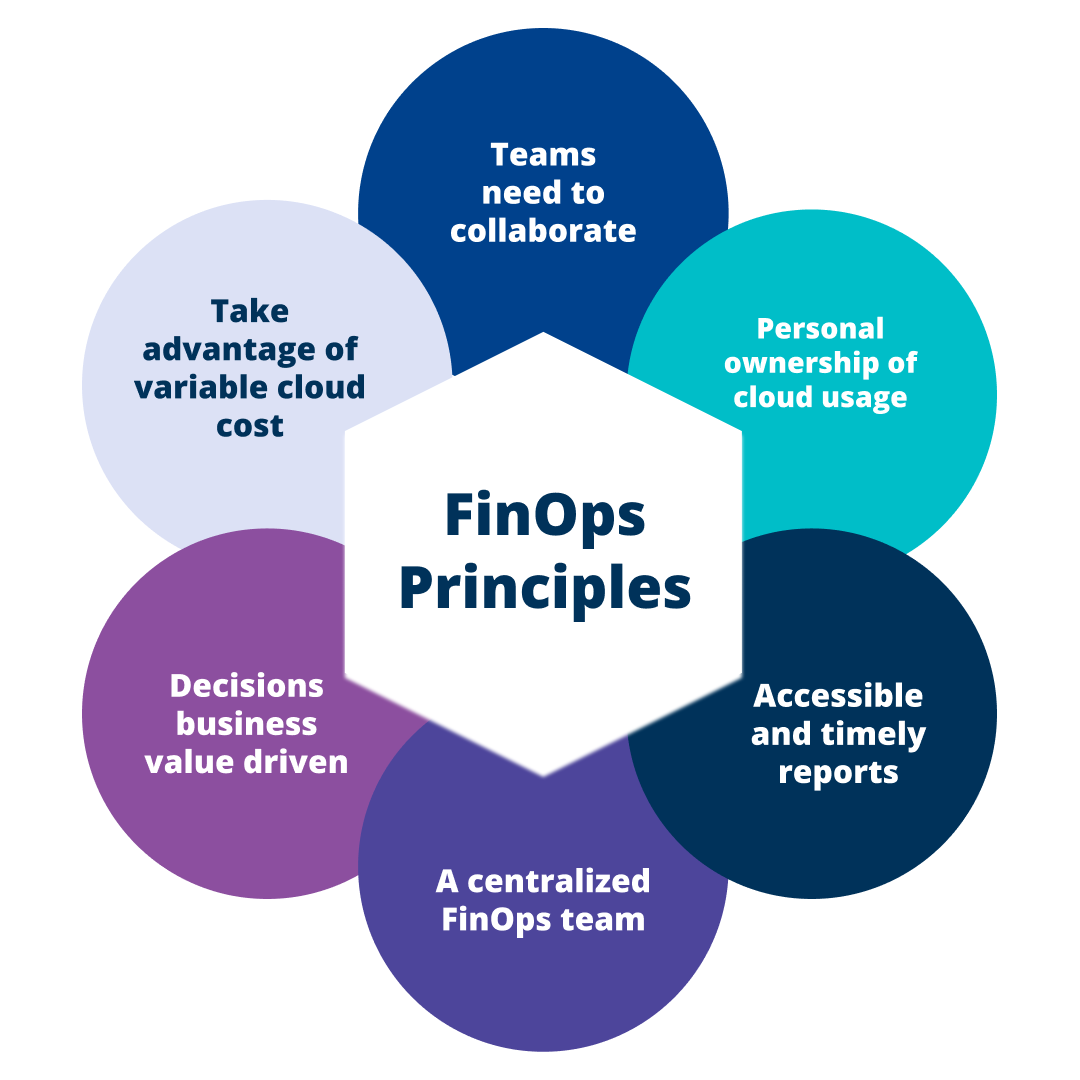To implement a successful FinOps practice within companies, a crucial initial step is necessary: thoroughly grasping its FinOps principles. These principles serve as the cornerstone of the entire FinOps Framework, and the success of its implementation hinges upon the company’s adherence to them.
The FinOps principles serve as the guiding compass for FinOps practices. They do not hold any hierarchical order or precedence; rather, they must be regarded as an interconnected set, each requiring adherence for the strategy to thrive. Achieving this demands full organizational awareness and active implementation across all levels.
This article uncovers six key FinOps principles that are essential for achieving success in the FinOps Journey, as we can see in the diagram below.

1. Effective team collaboration
The synergy between Finance and Technology teams is indispensable for a FinOps strategy to succeed. In practice, these teams must engage in continuous collaboration, underpinned by vigilant monitoring, given the granular nature of cloud pricing — measured per resource and per second. By working together harmoniously, these teams can perpetually refine efficiency and drive innovation.
The rise of cloud computing flipped this model on its head. Teams can now quickly set up infrastructure and experiment with new solutions, accelerating innovation. However, this freedom often led to unchecked spending and reduced visibility into costs. The FinOps approach addresses this issue by fostering a partnership between tech and finance teams to manage cloud expenses effectively.
2. Decisions based on the cloud business value
To ensure optimal decision-making regarding cloud costs, a comprehensive understanding of what truly adds value to the company is essential. This entails defining business metrics tied to cloud consumption, rather than merely assessing consumption in its entirety. Through this approach, initiatives yielding higher returns on investment (ROI) can be prioritized. Viewing the cloud as an enabler of innovation, coupled with leveraging these metrics, enables the identification of the most suitable investments.
3. Accountability for cloud consumption
One of the most crucial FinOps principles, although challenging to adhere to, is ensuring accountability for cloud consumption across all stakeholders. Teams are urged to autonomously manage their cloud usage within predefined budgets. Achieving this demands continuous and rigorous awareness-raising efforts, alongside establishing budgets aligned with business metrics. For instance, it’s impractical for a team overseeing e-commerce transactions to operate under a fixed budget, especially considering the anticipated surge in consumption during events like Black Friday in November.
4. Data visibility and access
Many of the principles pertain to shared responsibilities and decision-making. To facilitate this, another crucial principle is the accessibility of data to foster effective collaboration. Timely access to expenditure information is imperative. This enables prompt decision-making through more frequent tracking, monitoring, and alerts aligned with predefined budgets. By only assessing consumption monthly, we can lose the chance to grasp trends and respond swiftly.
5. Centralized staff
While FinOps requires collaboration across various departments, a centralized team must focus on the task of fostering, educating, and training in the best practices of the shared responsibility model throughout the organization. This centralized staff serves as the backbone of the FinOps framework, ensuring consistent application of principles and practices across departments, embedding FinOps culture deeply within the organizational fabric.
6. Leveraging the cloud’s variable pricing mode
The pay-as-you-go model of the cloud presents an opportunity to enhance value rather than risk. To capitalize on this, it’s imperative to abandon capacity guesswork and prioritize short-term iterative planning over static long-term plans.
By understanding these FinOps principles and ensuring organizational adherence to them, the likelihood of a successful implementation significantly increases. These principles, acting as the bedrock of the FinOps Framework, require holistic adoption throughout the organization. From fostering effective team collaboration to making informed decisions based on the business value of the cloud, and ensuring accountability for cloud consumption, each principle plays a crucial role.
Ready to optimize your cloud finances?
Discover how our FinOps Principles assessment can enhance your cloud cost management. Get in touch with our experts!







